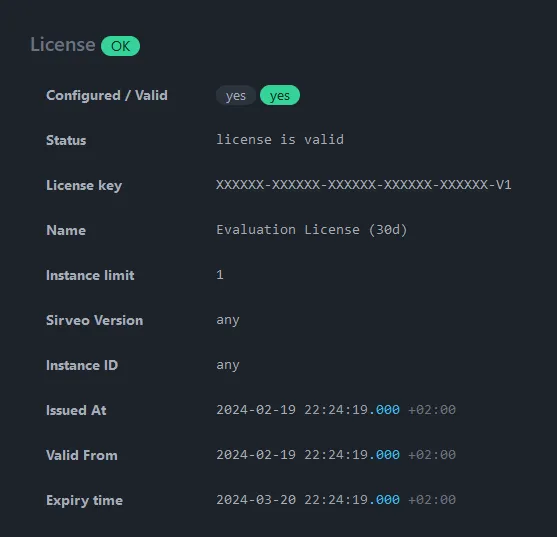Licensing
Sirveo servers require a valid license in order to execute flows. This reference covers license types, license management and related details for deploying Sirveo on your own infrastructure.
License types
Different license types are available for different deployment scenarios.
Evaluation licenses
Available for trying Sirveo at no cost. Request one here.
POC licenses
Available on request. Suited for longer term evaluations, which may involve multiple Sirveo servers.
Standard licenses
Purchased licenses for typical production deployments, whether on-prem or in the cloud.
Offline licenses
Purchased licenses for running Sirveo in air-gapped or high-security environments. These licenses do not require periodic online license verification, but they are issued for shorter validity periods, and at a premium to standard licenses.
| Evaluation | POC | Standard | Offline | |
|---|---|---|---|---|
| Validity Period | 30 days | 60 days | 365 + 15 days | 180 + 15 days |
| Online Verification | Yes | Yes | Yes | No |
| Offline grace period | 7 days | 7 days | 7 days | n/a |
Validity Period
Licenses have a fixed validity period, after which they expire.
- POC licenses are suitable for product evaluation that requires more time than an evaluation license.
- Standard licenses are valid for a year, and they have the largest offline grace period. They may also feature a variable activation limit.
- Offline licenses require no online verification, but are issued with a reduced validity period.
Online License Verification
Unless disabled by an offline license, Sirveo requires periodic online verification of its configured license. A reasonable offline grace period is permitted, during which online verification can fail any number of times.
The server attempts eager renewal of its online license verification, on a best-effort basis, to maximizes its offline grace period. Eager renewal is automatically attempted:
- If the last successful renewal occurred more than 24 hours ago, or;
- If there is less than 24 hours available on the last renewal’s offline grace period
A Sirveo server with a non-offline license will attempt one HTTP request to license.sirveo.io in a 24-hour period, to renew its online license verification.
If the server is in restricted mode because it exceeded the offline grace period, it attempts to automatically recover to a licensed state. This will cause an HTTP request to our license servers every 30 minutes.
Configuring a license
A server’s license is configured at startup, and cannot currently be changed during runtime via the UI or API.
Environment variable
SIRVEO_LICENSE="..."Configuration file
Using JSON configuration:
{ // ... "license": "eyJleHAiOj..." // ...}Using YAML configuration:
---license: "eyJleHAiOj..."CLI option
$ sirveo server --license="eyJleHAiOj..."Checking License Details
When Sirveo is running with a valid or expired license, its details is shown in the UI, on the “server details” in the left menu:

Alternatively, via the Sirveo binary directly:
# license is in file license.txt$ sirveo check-license --random-instance-id --file ./license.txt
# license is in environment variable SIRVEO_LICENSE$ sirveo check-license --random-instance-id --envOutput will indicate license details, if the input license is valid.
------------------License is valid------------------Validation Message: license is validLicense Key: XXXXXX-XXXXXX-XXXXXX-XXXXXX-XXXXXX-V1License Issued At: 2024-02-19T20:24:19ZLicense Valid From: 2024-02-19T20:24:19ZLicense Valid Until: 2024-03-20T20:24:19ZLicense Name: Evaluation License: 30dInstance Limit: 1Restricted mode
Without a valid license, Sirveo runs in restricted mode, which disables the flow engine. While in restricted mode, all server capabilities will work normally, except those relying on the flow engine. This specifically affects 5 features:
Flow editor test runs
The flow editor works normally, except that running a flow in test mode results in an error:
Server is in restricted mode, valid license required
Inbound webhooks
Requests to configured webhook URLs results in an error response with a 500 status code:
{ "error": "Unable to process request, server is in restricted mode" }Inbound links
Requests to configured link URLs (web flows) results in an error message:
Unable to process request, server is in restricted mode
Event triggers
Event triggers do not execute target flows. A debug log message is printed to the server log output when this occurs:
[events] triggers skipped: restricted mode type={event type}
Schedule triggers
Schedule triggers do not execute flows. A debug log message is printed to the server log output when this occurs:
[scheduler:trigger] skipped, server in restricted mode id={id of schedule trigger}